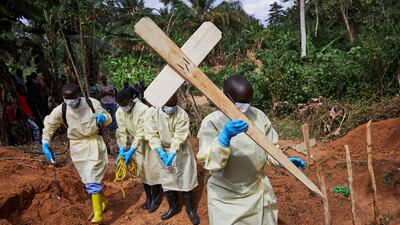At first sight, there might not seem to be an obvious connection between the health concerns of relatively affluent, middle class parents in the developed world and Ebola-stricken provinces of the Democratic Republic of the Congo. But there is an alarming rise of vaccination refusal in both, as a web of misinformation criss-crosses the planet. Few parents would knowingly place their child in harm’s way; the challenge facing most is knowing who to listen to. The sheer deluge of fake news, based on bogus medical advice that links vaccination to autism, now worms its way into homes via the internet and social media and makes that dilemma even harder. One of the chief proponents of such theories is the anti-vaccination movement, which is reportedly gaining traction in the UAE. Worldwide, cases of measles tripled in the first quarter of 2019, compared to the same period last year, with a shocking 700 per cent rise in Africa. We should not rebuke those who innocently believe questionable theories but endeavour to educate one
another and ourselves about the risks and dangers surrounding vaccination.
In the Democratic Republic of the Congo, some of the globe’s poorest and most vulnerable people are rejecting vaccines against Ebola, which has killed more than 1,000 people since last year. Here, there are parallels with the anti-vax movement. Survey data in the eastern DRC reveals that a quarter of respondents do not believe Ebola is real. Meanwhile, a lack of trust in health workers has made their task harder. The decision by former Congolese president Joseph Kabila to remove voting rights from those in affected areas also fuelled conspiracies. Elsewhere last month, amid rising violence and mistrust, Pakistan suspended its nationwide anti-polio campaign “for an indefinite period”. Clearly, this problem crosses cultural and financial divides.
The UAE, to its credit, has bucked the trend, with measles cases falling from 826 in 2015 to 173 in 2019. But in a connected world, the nation is not entirely immune. As The National reported, doctors have warned that anti-vax sentiment is gaining traction in the Emirates, with one in 10 parents reportedly taking a stand against innoculation. Refusing to vaccinate your child not only endangers them but potentially all those children with whom they share a classroom or playground. That is why the UAE carried out one of the largest public health campaigns in 2015, immunising 1.5 million children against measles. It is greatly concerning that the anti-vaccination movement has gained a foothold here, however small. With lives at stake, the peddlers of conspiracies must be held to account. Only by confronting them with public health campaigns can we consign their dangerous ideas to the dustbin of history.

